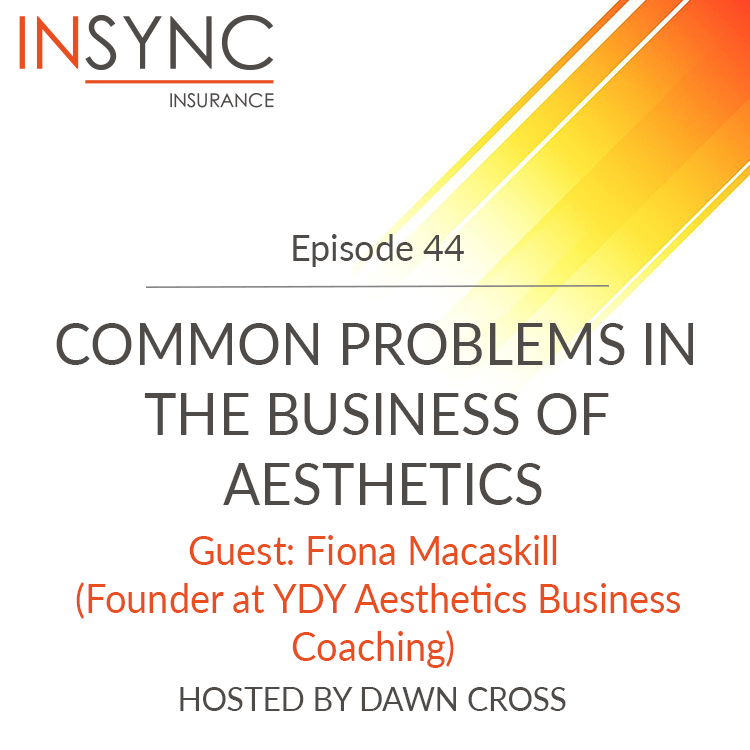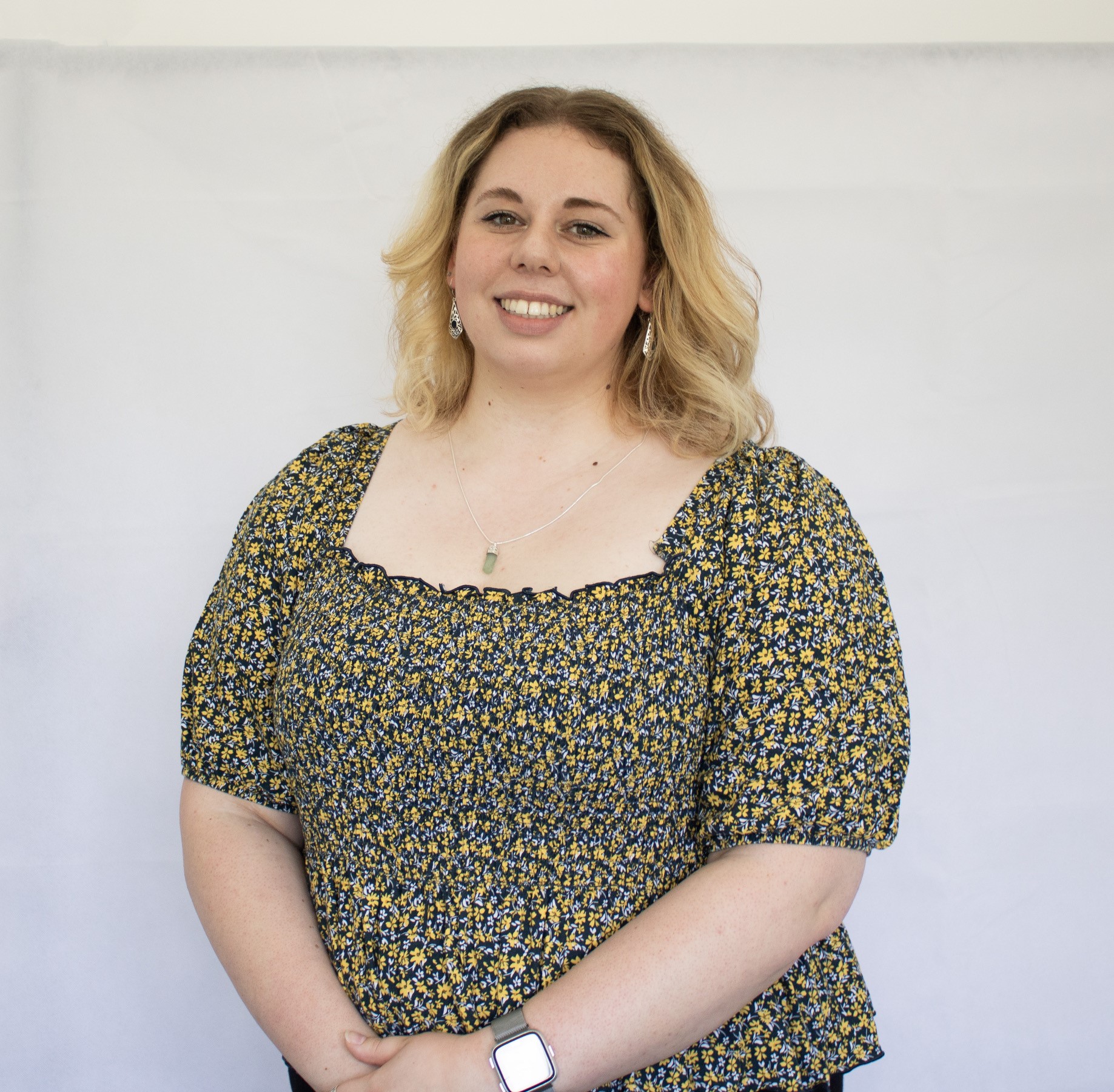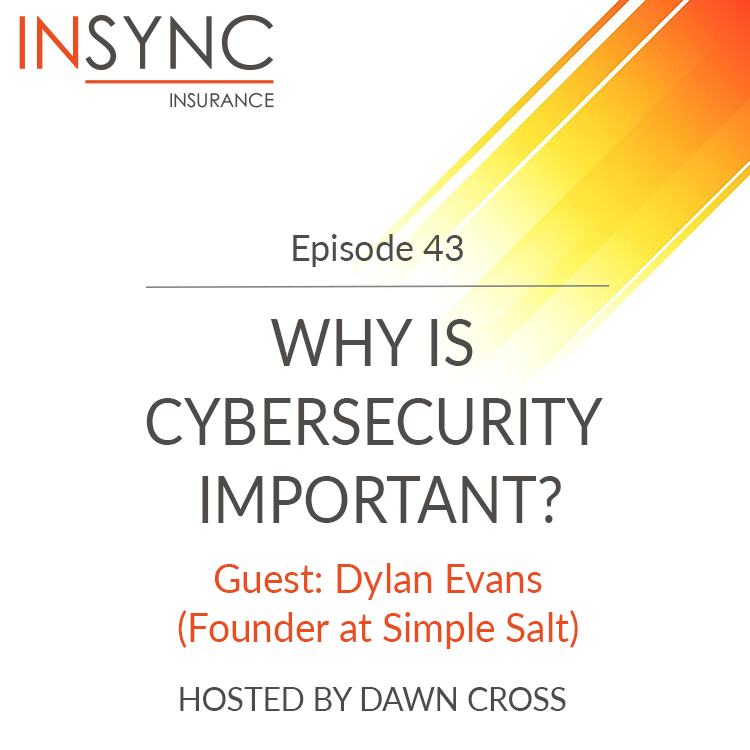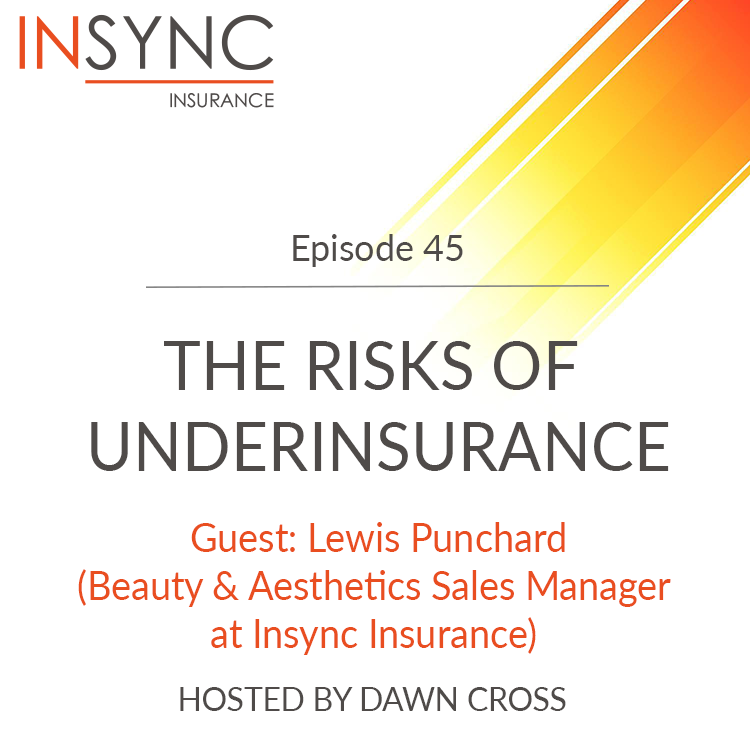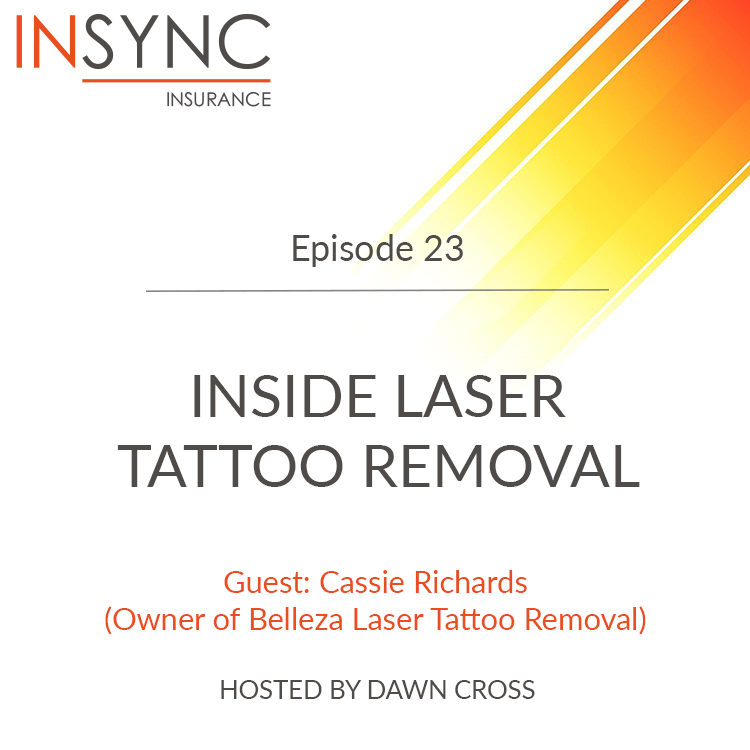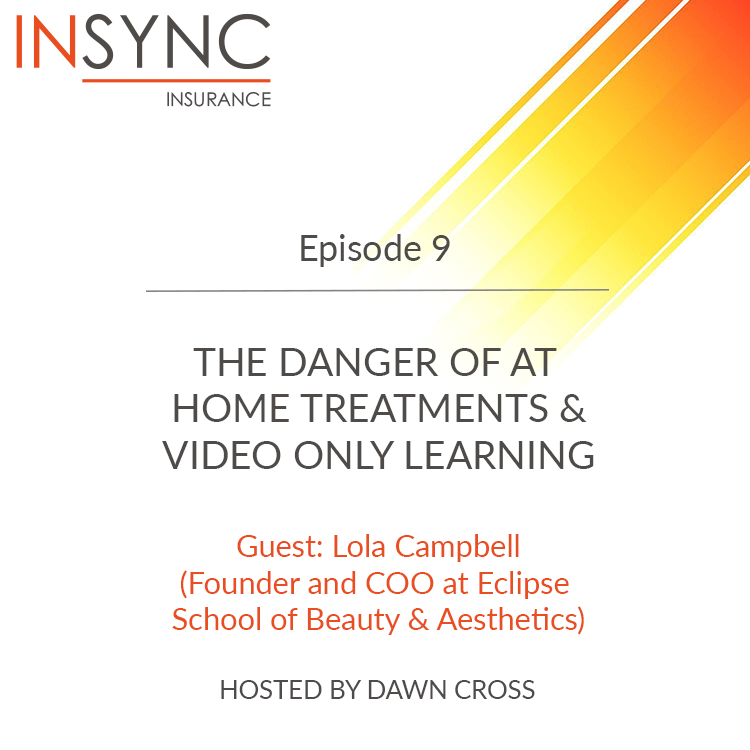Episode Transcript
[00:00:03] Speaker A: Welcome to the in Sync Assurance podcast. I'm your host, Dawn Cross, and today I'll be discussing common problems with the business of aesthetics with Fiona Maxgill, founder of UDu Aesthetics business Coaching.
If you enjoy our podcast, make sure to leave a rating on your favorite podcast directory.
[00:00:24] Speaker B: Or else, if I can get you set up, you could introduce yourself and what you get up to in your business.
[00:00:30] Speaker C: Yeah, I'm Fiona MacAskill and I have ydy business coaching, which stands for you. Do you?
And it's all about the aesthetics industry, really. I've worked in the aesthetics industry specifically for the last seven or eight years, ran a large academy and clinic. So we did lots of appointments, paying appointments per month and, you know, 25 to 30 courses a month as well.
Very industry specific knowledge. And actually that's where I fell in love with aesthetics itself. But I got lots of business knowledge from 20 years before that. But if I start naming the amount of years, then it kind of highlights my age a bit, doesn't it?
[00:01:14] Speaker B: Yeah, it just sounds like you're really well established, if anything.
[00:01:19] Speaker C: Good. Good, yeah.
[00:01:21] Speaker B: Brilliant. So obviously you're saying, you know, you do a coaching business, you know, can you tell me a bit more about that and like how, how you're able to help your clients?
[00:01:31] Speaker C: Okay. So I try and describe it as roots to tip. Business coaching and marketing in there as well. I never describe myself as a marketing expert because I think that you have marketing experts in different areas of marketing. You have some marketing experts which, who are overall marketing experts, but a lot of the marketing experts that you meet are very area specific, like marketing ads or SEO or email marketing. So I think marketing is a very broad subject. But my courses incorporate multiple layers of marketing and multiple layers of business knowledge and sense. And it's root to tip because I always describe growing a business as kind of imagining you're growing a butterfly tree. Why a butterfly tree? Well, it's because butterfly bushes and butterfly trees attract all the butterflies to them. The butterflies sit on them and they only want what that bush can give them effectively.
So the route to approach is the fact that most businesses need really, really strong roots to grow strong and to create a strong trunk and therefore grow the branches and attract the butterflies. But it's actually the area where a lot of businesses fall down, especially in aesthetics. They don't do all the root work first. And if you try and grow a tree without all those roots in place, then the first gust of wind, it will fall over and, you know, you won't have your tree anymore. So for me it's about what are all of the things you need to do to create a great business and market it well so that you have a profit and longevity and a business that really stands out from the crowd. So I don't really believe in two step programs or, you know, do this one thing and the world will be yours because I just think there are multiple things that you have to do.
You have to wear multiple hats to begin with and that can be a challenge when you're a small business. But hopefully you get to the point where you grow your business to an extent where you can then harness the power of other people working in your business as well, which then, you know, allows you to grow even further.
[00:03:48] Speaker B: That sounds absolutely amazing. It sounds like swell. You know, we were chatting the other day is that, you know, you go into aesthetics training. You know, you learn the techniques, you learn how to do like derma fillers, you know, whatever you want to specialize in, but you don't necessarily get that business side of things. You don't get taught, you know, how to attract clients, you know, how to build up your business, how to run and maintain one as well. You know, it's this stuff that you probably don't even think about. But, you know, actually, yes, I need to keep checking and doing the social media, but also kind of, you know, you need to keep a track of your expenses, stuff like that, because eventually you need sort of the money side of things.
It's something that I think, unfortunately, not everybody even thinks about when they get into training to go into this profession.
[00:04:32] Speaker C: Yeah, no, I think that's so true. I think people rush at it and they can be perpetual learners from the clinical side and they gain great skills and absolutely, that's a really powerful thing to gain all these really good skills. But if you just keep gaining the clinical skills and you don't add in any of the business and marketing skills, you're never going to be able to help your business thrive in the right way. And in fact, actually you get more emotionally stressed by it because you feel like, I've invested so much in the training, I've spent all of the time doing this and I'm still not managing to reach a customer base or, you know, I've got all of these skills, but everybody else has got all of these skills. So how do I make my skills stand out from the crowd? And there are lots of techniques around that. There are, you know, there are lots of routes forward you can take.
And actually it's quite easy to pick up knowledge from the Internet these days of saying, oh, well, I'll listen to this and I'll listen to that. And you grab a bit of knowledge here. But knowledge isn't power unless you can actually turn it into something. So what you have to do is you have to have that layer of accountability that helps you drive your business forward. You have to have that sounding board that can give you information that you can't pick up from listening to a webinar on it or reading a PDF or getting a free download. You have to be able to glue all of that knowledge together and have somebody hold you accountable for achieving the next thing. So accountability is a massive thing. It's why deadlines work, isn't it? If you have a deadline, you're more likely to work to that deadline and achieve something. If you don't have a deadline, if you don't have somebody asking you questions about things, it's quite easy to kind of come up with excuses as to why you've stayed in your comfort zone and not pushed beyond it to, you know, get to the things that are really juicy and actually will make your business thrive.
[00:06:37] Speaker B: Definitely. So one of my first questions from today is, you know, what are the most common problems that you see among estheticians that come to you for help and advice?
[00:06:49] Speaker C: I think one of the biggest problems is mindset and overwhelm. As I said, I meet a lot of people who are actually quite far down the journey. So I have new people who come to me who have been perhaps in the NHS for years and then decide to break out and do aesthetics. And they have a genuine passion for it. But I also have people who have been doing it for two or three or four years, but haven't yet managed to turn it into a successful business. And a lot of that is to do with information overload.
And, you know, we all get into this hideous doom scrolling on social media and looking at what other people are doing and thinking, should I copy that or am I missing out on that? Or, you know, all of those sort of things. And that doom scrolling is a nightmare because you're constantly comparing yourself to other people who appear to be busier or have new ideas that you haven't got. And so it paralyzes you.
You get into the state of paralysis where you can't move forward or back, but actually you've invested a load of money already into achieving the skills you've got, but you can't actually do anything with them. So the first thing I do is kind of look at the vision and the purpose and the why behind, why people went into it.
Kind of unravel those knots and then look at the mindset and unblock the overwhelm, which allows them to go forward with a plan. Plans are a miracle. Planning your business, properly planning your steps forward is often a step people skip. They just drop into it and they don't plan it. But if you plan it, it makes life so much easier.
[00:08:31] Speaker B: Quite interesting as well. There's like, you need. You do have a range that do come to you. So it's not like I feel like, you know, everyone is sort of in the same boat.
No matter kind of where you are on the journey. And especially at the minute, there is seems to be a lot of the same sort of discourse or people struggling as well. And I think, you know, obviously, the pandemic as well has had a massive effect on, you know, people, obviously, even down to complications change, because people who have contracted Covid-19, stuff like that actually react differently now to a lot of different, like, salon grade or prosthetics products, especially with, like, dying hair and everything. We had a previous episode where someone who patch tests always fine, but then one time they did patch test them after kind of the initial lockdown, when things got back to normal, and all of a sudden, they had a massive reaction to what was normally like, a safe product that they always were okay with, which is why, like we always say, you know, especially with safety procedures, stuff like that, it's always key to keep them on, even if, you know, all they deal with that fine.
[00:09:31] Speaker C: It's a.
[00:09:31] Speaker B: It's all good. It's like something could change easily, isn't it?
[00:09:36] Speaker C: Yeah. And I think actually, since the pandemic, fear is a big thing anyway, I think people are just more fearful, and that's a difficult thing to get over. So it's fear of complications. It's kind of fear of the unknown. It's almost around that conversation when my children used to that asked me when they were young, would such and such ever happen? I'd go, oh, no, don't be daft. That would never, never happen.
But since COVID you feel like you can't say never, never about anything. It's always like it might happen. And so. And that feeds into your ability to push outside your comfort zone as well, which, as a business entrepreneur, you need to do. You need to do something uncomfortable every single day in your business to make progress. And if you. If for 90 days, you sat down and did something uncomfortable in your business, so you pushed yourself forward in an incremental way for 90 days.
You would do great things with your business, but we're even less programmed to do that now than we used to be. So, yeah, I think I. Yeah, I think there's a lot of worry that goes around now.
[00:10:55] Speaker B: So my next question is, what key aspects should aestheticians kind of focus on when running their business? Because I think we'd like to assume the majority of them are going to be self employed, although some do kind of run within like a salon or clinic.
[00:11:11] Speaker C: So interestingly, I was, when I talk about route to tip, I was doing some mind mapping. I love doing a bit of mind mapping. When I'm trying to work something out and trying to visualize how I want to explain it to somebody, I tend to draw it out in a big way. So I was drawing out my butterfly tree and looking at what that meant. And what's staggering about it is that root system is absolutely everything. And within the root system, it's everything from your company vision to your documented milestones and targets, to understanding your perfect patient and who it is that you're aiming towards. It's about multiple layers of marketing. Everybody worries about social media. Most of the people I meet initially are spending 80% of their time panicking about social media as a form of marketing. And yet statistically, when you look at our types of businesses, you know, aesthetics and skincare businesses, less than 10% of their bookings will come from social media. And the rest of the bookings will come from, you know, good SEO and search engines and direct marketing and email marketing and all of that kind of thing. So if you're spending 80% worrying about social media, such a missed opportunity.
And also, if you're just worrying about one layer of marketing, then you're putting all your eggs in one basket. Whereas if you can develop multiple layers of marketing, you know, if the algorithm changed and, you know, your followers dropped off the face of the earth, then you'd still have the other layers of marketing to keep you going. Equally, if something happened on your website which slowed traffic down through Google and, you know, you drop to the bottom of the page instead of being at the top of your page, you'd have your other layers of marketing to keep you going. So having multiple layers of marketing and developing the systems and automation in your business to make those as painless as possible is really important. And often people haven't taken the time to do all of that. They say, oh, I know I should be doing this, and I know I should be doing that I'm just not doing it.
And actually, when you, when you say to people, well, actually, stop worrying about social media, it's fabulous. I'm not saying social media isn't important. Of course it's important. You know, we all need a great shopfront.
People always love to go and have a look at other people. And of course, you will get some bookings on social media. So I'm not saying ignore it. I'm just saying it is one of your routes to market. It is not the be all and end all.
But before you even start down your roots of marketing, you have to work out who you are, what you stand for, what your company stands for, and actually stop doing what everybody else is doing because it may appear to be working for them, but actually it's not as straightforward as that.
Some people are very good at appearing to be doing marvelously well when they're not doing quite so well. So if you're copying what they're doing, you haven't necessarily found the holy Grail. You know, you're just copying something that might work or might not work. So you have to find your own route to market. You have to find your own voice.
[00:14:34] Speaker B: I think, as well. You know, adding from the marketing side of things is that finding your kind of target audience as well, because, you know, some people might want to specialize more kind of aesthetics for men. You may want to be targeting women of a certain age, and obviously, depending on the age range and stuff like that, social media, like I said, you know, may not actually be the best route possible. Sometimes it's word of mouth, sometimes maybe you need to do more on Facebook, sometimes you need to go more on Instagram. So having that research base as well, so then it's like, you know, those being present on social media, I think it's almost kind of like a given with any sort of business nowadays, you know, but finding kind of who you're looking for and trying to target, and then obviously you can tailor your marketing in a way. So then hopefully, do you get that? I mean, you know, you don't have to focus on a certain age range, you know, so any, anyone wants aesthetics done, anyone wants Botox or filler or whatever, but it's having that sort of mindset, isn't it? Like, if you've got a target audience, you know, to do even like changing the language and your posts and stuff like that can make a huge difference. And once you have that sort of goal, it's a bit easier then to also do social media. And maybe you won't even feel as stressed or worried about it because you've got a good idea where you're going and who you're aiming for.
[00:15:52] Speaker C: Yeah, absolutely. Your perfect patient is one of the biggest roots in your business because everything comes from that. Your tone, the language you use in all of your met layers of marketing, your ideal customer journey, you know, the treatments that you offer, everything comes down to who it is that you're speaking to. You know, in a famous marketing quote is if you're marketing to everyone, you're marketing to nobody at all. And, you know, that is fundamentally, really, really true. If you're spreading your message so thinly because you're trying to grab everybody who's going to pay attention to you, that you don't stand for anything, really.
Whereas if your voice is relevant and if it resonates at the right level with the right people, there are plenty of those people around you who will want to flock to come to you. And then it won't matter whether you're on a high street with people to the right of you or the left of you. It really doesn't matter because it's your voice that's resonating with, with your audience. And they'll walk through your door and come to you and they won't be questioning you on price because they can see your value and they will trust what you have to say to them. So you'll be able to offer them a really authentic, strong service that will give them results driven treatments. And you won't have to fight that hard for it because you've already put the right messages out there towards the right people. But you have to be brave enough to decide that you want to kind of niche down or really focus on a perfect patient. And one of the questions I get asked a lot is, does that mean that I'll narrow my audience and I won't get anybody else? And it never works that way. You know, you can speak a language to a certain person and you can really get to know them and understand them and everything they need, but, you know, they'll have sisters or mothers or, you know, daughters who they recommend you to, who may not be that perfect patient as you see them, but equally, they're people who need help and they have that trusted referral from somebody who is your perfect patient. And so you will get those people into, into your business as well. So it's not, it's not really narrowing your, your business. It's just actually making it easier to market your business and authentically offer a message that does allow you to stand out from the crowd rather than doing what everybody else is doing.
[00:18:33] Speaker B: Absolutely. So, well, I feel like we've picked your brains fairly well here. Is there anything else you'd like to before we wrap up the episode today?
[00:18:42] Speaker C: No, no, but obviously I'm coach, so I would absolutely say this, but getting coaching, whether that would be with me or anybody else, I think is vital to driving your business forward. You know, coaches have coaches because actually coaching is about taking that person and allowing them to unpack everything that's within them, but then to put it in a formatted way that allows them to drive their business forward in a kind of a faster, more meaningful fashion. So, you know, whatever you're thinking about doing in your business, try and find somebody that you are accountable to that will enable you to stay on track and to stay focused. And that's one of the biggest challenges, is staying on track and staying focused.
[00:19:34] Speaker B: I agree. Well, thank you so much for coming on today. It's been really great to hear your side of things.
[00:19:39] Speaker C: Thank you. My pleasure.
[00:19:44] Speaker A: Thank you to my guests today, Fiona, for chatting about her expertise and common problems within business of aesthetics. If you're interested in her coaching services, please click the link in the description.
I have been your host, Dawn Cross and tune in next week for another episode.
NSYNC is one of the UK's fastest growing insurance providers, offering common comprehensive cover for SME's and the self employed across the UK. Our expert team can tailor your insurance, meet your individual business needs and compare prices. From our Lloyds of London approved partners, we offer a five star service and have been FiFO platinum trusted winners five years in a row.
